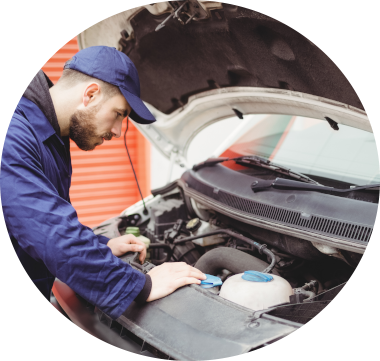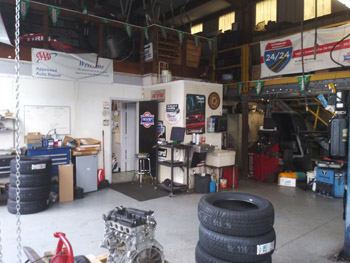All Categories
Featured

When it comes to vehicle maintenance, the brakes are arguably the most vital system for guaranteeing your security. Routine brake evaluations are essential to keeping your braking system in top problem.
- Why Brake Assessments Are Vital. Brakes are created to put on down gradually, but without routine evaluations, you might not observe when they end up being less efficient. A malfunctioning brake system can cause significant crashes, boosted repair prices, and also the demand to change various other vehicle parts.
Brake assessments not only help you catch possible problems before they escalate, however they additionally allow for much better stopping efficiency, raised car lifespan, and boosted safety.
- Identifying Indication for Brake Issues. While routine inspections are vital, you do not need to wait until your auto's next visit to the auto mechanic. Enjoy for these indication that may suggest it's time for an evaluation:
Uncommon Noises: A shrill squeal or grinding sound when using the brakes typically signals that the brake pads are worn down or damaged. Soft or Spongy Brake Pedal: If the brake pedal really feels soft or spongy when pressed, there might be air or moisture in the brake lines, or the brake fluid might be reduced. Drawing to One Side: If the automobile draws to one side while stopping, it can show unequal brake pad wear or a hydraulic problem in the brake system. Vibration in the Guiding Wheel or Pedal: If you experience vibration or pulsation when braking, it may be a sign of warped blades or irregular brake pad wear. Boosted Quiting Distance: If it takes longer than typical to bring your auto to a stop, it may be time to inspect the brake pads, fluid levels, or rotors. If you notice any of these indicators, it's ideal to have your brakes inspected immediately by a professional.
- Secret Elements Checked Throughout a Brake Evaluation. During a brake evaluation, a qualified technician will check out several crucial components of the brake system to ensure they're functioning appropriately. Several of one of the most fundamental parts to check include:
Brake Pads: These are the friction material that presses against the brake blades to reduce down the lorry. Gradually, the brake pads use down and require changing. Brake Rotors: Blades are the metal discs that the brake pads clamp down on. They should be smooth and totally free of deep grooves or fractures. Brake Fluid: The brake liquid moves the pressure from the pedal to the brakes. Low fluid levels or old, contaminated fluid can result in inadequate braking efficiency. Brake Lines: Brake lines carry liquid from the master cyndrical tube to the brake parts. They should be examined for leaks, cracks, or damages. Brake Calipers: These clamp the brake pads onto the blades. They need to remain in good functioning order and devoid of leakages. Consistently examining these elements guarantees your stopping system functions efficiently and helps you prevent dangerous driving circumstances.
- Exactly how Typically Should You Get Your Brakes Inspected? The regularity of brake inspections depends on your driving habits and the kind of lorry you have. As a basic guideline, it's recommended to examine your brakes at the very least yearly or every 12,000 miles. However, if you drive in hefty traffic, often lug hefty loads, or drive on sloping terrain, more regular assessments might be required.
It's likewise an excellent concept to have your brakes inspected if you discover any one of the indication pointed out earlier, as this can prevent a lot more serious problems.
- The Cost of Ignoring Brake Inspections. Neglecting routine brake examinations can result in significant repercussions. Used brake pads, harmed rotors, or low brake fluid can trigger your stopping system to fall short when you require it most. Along with the security threats, neglecting brake maintenance can lead to expensive fixings down the road.
As an example, if the brake pads are not changed in time, the damages can expand to the rotors, bring about the demand for rotor substitute-- an expensive repair work. By organizing routine brake assessments, you can avoid these pricey repair work and keep your stopping system in good condition for longer.

- What Takes place Throughout a Brake Inspection? A specialist auto mechanic will certainly do a thorough evaluation of your automobile's braking system, including inspecting for the complying with:
Brake Pad Thickness: Brake pads need to be replaced when they have actually put on down to a particular density. Rotor Problem: The technician will check the rotors for signs of wear, bending, or racking up. Brake Liquid Degree: Low brake fluid can influence braking performance. The auto mechanic will inspect the liquid level and renew it if required. Brake Line Honesty: The brake lines will be checked for any leakages or fractures that might endanger the brake system. As soon as the examination is total, the auto mechanic will certainly notify you of any type of needed repair services or replacements.
Verdict: Remain Safe with Regular Brake Inspections. Your brakes are necessary to keeping you and your travelers secure when traveling, so normal brake evaluations should never ever be disregarded. By taking note of caution indicators, organizing regular brake checks, and attending to issues immediately, you can guarantee that your brakes are always in leading form.
Don't wait till your brakes fall short-- stay aggressive about brake upkeep. A little financial investment in brake inspections today can conserve you from expensive repair work and hazardous situations in the future.
Latest Posts
Experience WyHy Federal Credit Union – Top Perks for Your Money Goals
Discover Your Partner at WyHy Reduces Your Costs on Financing and Accounts
Shield and Enhance Your Home with Weathercraft's Exterior siding Solutions
More
Latest Posts
Experience WyHy Federal Credit Union – Top Perks for Your Money Goals
Discover Your Partner at WyHy Reduces Your Costs on Financing and Accounts
Shield and Enhance Your Home with Weathercraft's Exterior siding Solutions
